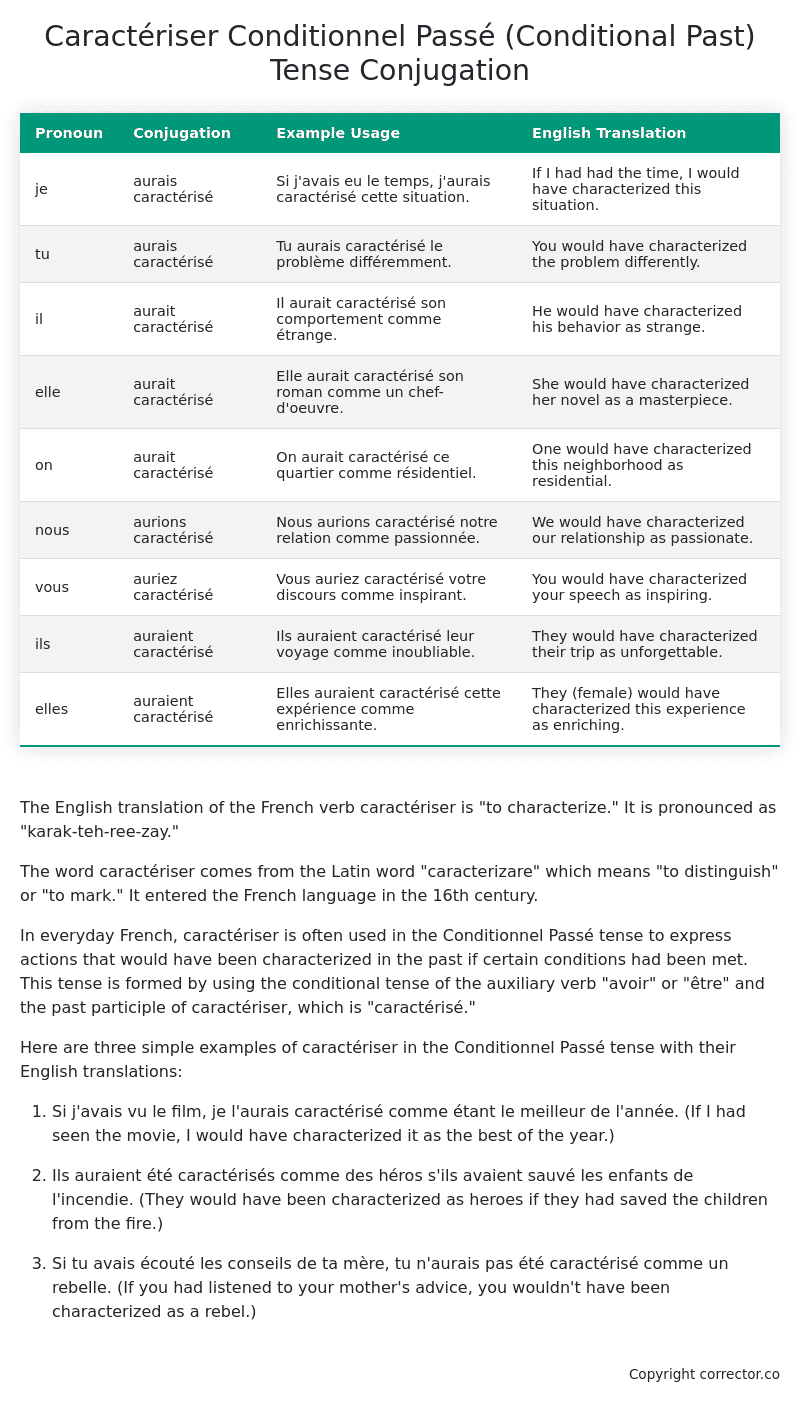Conditionnel Passé (Conditional Past) Tense Conjugation of the French Verb caractériser
Introduction to the verb caractériser
The English translation of the French verb caractériser is “to characterize.” It is pronounced as “karak-teh-ree-zay.”
The word caractériser comes from the Latin word “caracterizare” which means “to distinguish” or “to mark.” It entered the French language in the 16th century.
In everyday French, caractériser is often used in the Conditionnel Passé tense to express actions that would have been characterized in the past if certain conditions had been met. This tense is formed by using the conditional tense of the auxiliary verb “avoir” or “être” and the past participle of caractériser, which is “caractérisé.”
Here are three simple examples of caractériser in the Conditionnel Passé tense with their English translations:
-
Si j’avais vu le film, je l’aurais caractérisé comme étant le meilleur de l’année. (If I had seen the movie, I would have characterized it as the best of the year.)
-
Ils auraient été caractérisés comme des héros s’ils avaient sauvé les enfants de l’incendie. (They would have been characterized as heroes if they had saved the children from the fire.)
-
Si tu avais écouté les conseils de ta mère, tu n’aurais pas été caractérisé comme un rebelle. (If you had listened to your mother’s advice, you wouldn’t have been characterized as a rebel.)
Table of the Conditionnel Passé (Conditional Past) Tense Conjugation of caractériser
| Pronoun | Conjugation | Example Usage | English Translation |
|---|---|---|---|
| je | aurais caractérisé | Si j’avais eu le temps, j’aurais caractérisé cette situation. | If I had had the time, I would have characterized this situation. |
| tu | aurais caractérisé | Tu aurais caractérisé le problème différemment. | You would have characterized the problem differently. |
| il | aurait caractérisé | Il aurait caractérisé son comportement comme étrange. | He would have characterized his behavior as strange. |
| elle | aurait caractérisé | Elle aurait caractérisé son roman comme un chef-d’oeuvre. | She would have characterized her novel as a masterpiece. |
| on | aurait caractérisé | On aurait caractérisé ce quartier comme résidentiel. | One would have characterized this neighborhood as residential. |
| nous | aurions caractérisé | Nous aurions caractérisé notre relation comme passionnée. | We would have characterized our relationship as passionate. |
| vous | auriez caractérisé | Vous auriez caractérisé votre discours comme inspirant. | You would have characterized your speech as inspiring. |
| ils | auraient caractérisé | Ils auraient caractérisé leur voyage comme inoubliable. | They would have characterized their trip as unforgettable. |
| elles | auraient caractérisé | Elles auraient caractérisé cette expérience comme enrichissante. | They (female) would have characterized this experience as enriching. |
Other Conjugations for Caractériser.
Le Present (Present Tense) Conjugation of the French Verb caractériser
Imparfait (Imperfect) Tense Conjugation of the French Verb caractériser
Passé Simple (Simple Past) Tense Conjugation of the French Verb caractériser
Passé Composé (Present Perfect) Tense Conjugation of the French Verb caractériser
Futur Simple (Simple Future) Tense Conjugation of the French Verb caractériser
Futur Proche (Near Future) Tense Conjugation of the French Verb caractériser
Plus-que-parfait (Pluperfect) Tense Conjugation of the French Verb caractériser
Passé Antérieur (Past Anterior) Tense Conjugation of the French Verb caractériser
Futur Antérieur (Future Anterior) Tense Conjugation of the French Verb caractériser
Subjonctif Présent (Subjunctive Present) Tense Conjugation of the French Verb caractériser
Subjonctif Passé (Subjunctive Past) Tense Conjugation of the French Verb caractériser
Subjonctif Imparfait (Subjunctive Imperfect) Tense Conjugation of the French Verb caractériser
Conditionnel Présent (Conditional Present) Tense Conjugation of the French Verb caractériser
Conditionnel Passé (Conditional Past) Tense Conjugation of the French Verb caractériser (this article)
L’impératif Présent (Imperative Present) Tense Conjugation of the French Verb caractériser
L’infinitif Présent (Infinitive Present) Tense Conjugation of the French Verb caractériser
Struggling with French verbs or the language in general? Why not use our free French Grammar Checker – no registration required!
Get a FREE Download Study Sheet of this Conjugation 🔥
Simply right click the image below, click “save image” and get your free reference for the caractériser Conditionnel Passé tense conjugation!

Caractériser – About the French Conditionnel Passé (Conditional Past) Tense
Formation
Common Everyday Usage Patterns
Expressing Unreal Past Scenarios
Polite Requests or Suggestions
Expressing Doubt or Uncertainty
Interactions with Other Tenses
Conditional Present
Indicative Past Tenses
Conditional Future
Summary
Want More?
I hope you enjoyed this article on the verb caractériser. Still in a learning mood? Check out another TOTALLY random French verb conjugation!


